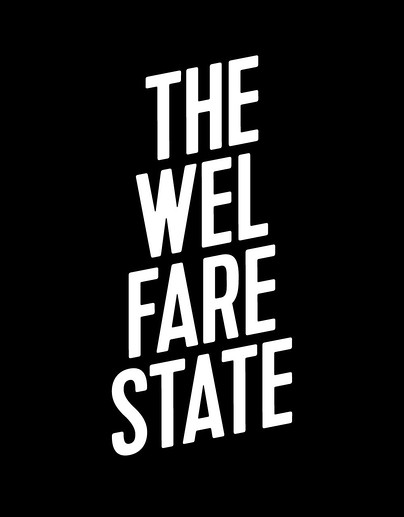Anders Kreuger (ed.): The Welfare State (2015)
Filed under catalogue | Tags: · art, labour, politics, welfare state

“The welfare state is an abstract notion. But also very concrete. Political, but also bureaucratic. What does it have to do with art?
The welfare state operates with regulations, rights and obligations that apply to everyone in the same way, requiring individuals to identify themselves as members of society first and foremost. In this sense, the welfare state is the antithesis of art. Many artists support the welfare state in both theory and practice, and they are fascinated by rules as such, but they have little interest in following rules formulated by others than themselves..
The welfare state is an emancipatory political project, although it was first invented as a way of keeping class struggle and revolution at bay. It is hard to disassociate the European welfare state from the darker elements of recent history, such as militarism, colonialism and the degradation of the natural environment. Yet the welfare state, as a model for social cohesion and political stability, is now gaining ground in new parts of the world, notably in East Asia.
The exhibition The Welfare State does not look back with nostalgia at the welfare state in its ‘classical’ form as a utopian blueprint for an egalitarian (and homogenous) society in postwar Western Europe. It does not invite artists to ‘illustrate’ political and social engagement. But it does ask some fundamental questions. What is the ‘imaginary’ of the welfare state? Does it have a ‘form’? Can it be ‘shown’?”
Contributions by Stephen Willats, Josef Dabernig, Róza El-Hassan, Francisco Camacho Herrera, Anne-Mie Van Kerckhoven, Artūras Raila, Kajsa Dahlberg, and Donna Kukama.
With an introduction by Anders Kreuger
Publisher M HKA, Antwerp, 2015
ISBN 9789072828521
139 pages
PDF (11 MB, updated on 2020-10-19)
EPUB (22 MB, updated on 2020-10-19)
Asbjørn Wahl: The Rise and Fall of the Welfare State (2009/2011)
Filed under book | Tags: · neoliberalism, politics, welfare state, work

In an age of government imposed austerity, and after 30 years of neo-liberal restructuring, the future of the welfare state looks increasingly uncertain. Asbjørn Wahl offers an accessible analysis of the situation across Europe, identifies the most important challenges and presents practical proposals for combating the assault on welfare.
Wahl argues that the welfare state should be seen as the result of a class compromise forged in the 20th century, which means that it cannot easily be exported internationally. He considers the enormous shifts in power relations and the profound internal changes to the welfare state which have occurred during the neo-liberal era, pointing to the paradigm shift that the welfare state is going through. This is illustrated by the shift from welfare to workfare and increased top-down control.
As well as being a fascinating study in its own right that will appeal to students of economics and politics, The Rise and Fall of the Welfare State also points to an alternative way forward for the trade union movement based on concrete examples of struggles and alliance-building.
First published in Norwegian as Velferdsstatens vekst – og fall?, Gyldendal Arbeidsliv, Oslo, 2009
Translated by John Irons
Publisher Pluto Press, 2011
ISBN 0745331408, 9780745331409
246 pages
review (Sophie Smith, Socialist Review)
Comment (0)Christopher Kullenberg: The Quantification of Society: A Study of a Swedish Research Institute and Survey-based Social Science (2012)
Filed under thesis | Tags: · actor-network theory, data, research, social science, society, sweden, welfare state
This thesis is concerned with the contemporary history of quantitative surveys in Sweden. The core epistemic practice of constructing surveys is examined empirically through a case study of the SOM Institute (Samhälle, Opinion, Medier) at University of Gothenburg. The SOM Institute has performed surveys in Sweden since 1986. However, the methodology of quantitative surveys with representative sampling techniques dates back to the 1940s. A central theme in this theses is to follow how these methods and techniques have been made to work under different historical circumstances.
Theoretically, this thesis relies on concepts that are derived from classical Actor-Network Theory (ANT) and then further developed. This conceptual tool-box is then utilized to select moments in the history of surveys that are of special importance for understanding how Swedish society has been quantified.
Special attention is drawn to how the accuracy of surveys is established through mutual reinforcement with previous data. By closely studying how the SOM Institute conducted their first postal surveys in the 1980s, the relation and importance of other, contemporary surveys is emphasized. Moreover, the creation of a state-science interface is described by going back in time to the 1950s and the creation of the first academic surveys. This was also the moment in history when random samples were established. Here, the impact of the creation of the welfare state and the role of science in this political project is discussed and related to the expansion of the social sciences.
To further understand the border between academic science and pollster research, a controversy that took place during the elections of 1985 is studied. The controversy was ignited because pollster data predicted that the conservative party (Moderaterna) would win the elections. However, this turned out to be false. What followed was a debate concerning both the accuracy of different methodologies and the political bias of different surveys. Academic scientists succeeded in creating a position that guaranteed value-free social science, which later would have an impact on the future of social scientific investigations.
The dissertation concludes that the way social phenomena are quantified today, must be understood in a historical context that includes the epistemic practice of social scientists. The creation of large-scale quantitative surveys not only presupposes certain aspects of modern society, it also transforms these societies.
Keywords: Quantification, survey, SOM Institute, social science, epistemic practice, Actor-Network Theory, welfare state, center of calculation.
Dissertation thesis
Department of Philosophy, Linguistics, and Theory of Science, University of Gothenburg
ISBN 978-91-628-8458-1
Kopimi
225 pages

